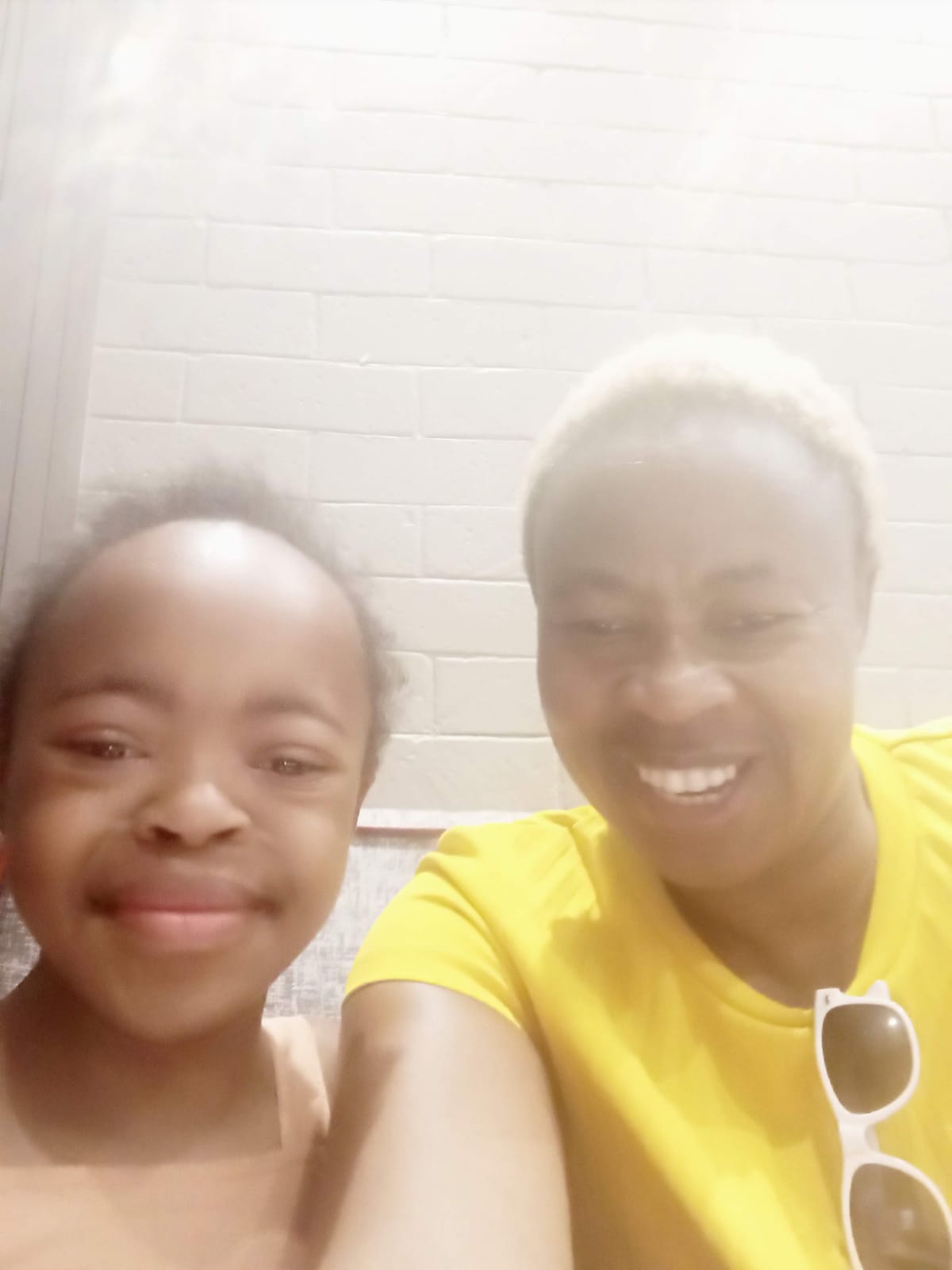Raising a child with Down syndrome requires patience and information. Elsie Mokwena
Share

Today is World Down Syndrome Day, observed under the theme ‘End the Stereotypes’ globally. Although education around the condition abounds, Down syndrome is still associated with certain stigmas that affect the quality of life for those who live with it.
Down syndrome is defined as a chromosomal disorder arising at conception where there is an extra 21 chromosome (Trisomy 21), which causes delays in physical and intellectual development.
The journey of those who are diagnosed and family members proves to be a daunting journey of acceptance, learning, and embracing.
This is the story of Elsie and her 14-year-old daughter, Boikgantsho Mokwena.

Mother and daughter taking selfies
When Elsie Mokwena found out that her daughter had Down syndrome immediately after giving birth, she was left confused about what that meant for her. She found herself scared of the unknown, especially since she was unfamiliar with the term down syndrome. Life took a drastic turn that even went as far as affecting her marriage.
“Upon finding out, I was extremely clueless. I was not prepared for this; I was carrying a child, expecting her to come out with no medical issues. The acceptance phase took such a long time that I even ended up becoming an alcoholic, trying to drink the pain away.”
Because of frustration and confusion, she quit her job.
“And due to the lack of knowledge of what the condition is all about, me and the father were always fighting. We would blame each other about whose side of the family was to blame; we would say things like ‘we are bewitched’ because we thought people were jealous of us. We had so many excuses, and those delayed us from accepting what it is that we are dealing with.”
The days that followed were excruciating. But there came a time when she had to not only accept what she was faced with but also accept herself as a mother to a child with Down syndrome. That acceptance opened her up to healing, and she cited her community’s support as playing a huge role in her healing journey.

Elsie Mokwena giving a talk about Down Syndrome at a clinic
“I was actually so surprised at how accepting everyone around me was. The Down Syndrome Association of Pretoria/Tshwane also played a huge part in my journey of learning how best I can be a mother to my daughter, so she is also well taken care of.”
Her journey from finding out right through accepting led Elsie to find her passion in giving the same support to parents who also find themselves in a similar situation to the one she was in.
“My daughter does not receive any special treatment. I treat her the same as all my other children.” Elsie is the mother of three.
She also adds that limitations are normally placed by society on children with Down syndrome, whereas the reality is that everyone has the same capabilities as anyone else to be or do anything they desire.
“While some might think of children with Down syndrome as not being able to live sustainable lives, my daughter does her chores like everyone else in the house; there is no special treatment, and we encourage everyone around us to treat and communicate with her in a proper way.
“I am raising a self-sufficient child who can traverse life, and that requires society to not impose their limitations on her,” she added, adding that Boikgantsho attends a mainstream school.
“Immediately, once you pass the stage of acceptance, everything else falls into place. Information is vastly available for anyone to access; it just needs one to be willing to educate themselves. The more educated one is, the easier the journey is. You will also understand the emotional support that you, as the parent, need, the support you need to give your child, and how to educate those around you.

A therapy session with parents and kids at Down Syndrome Association of Pretoria/Tshwane
“You need to create a conducive environment of acceptance that has zero limitations and of love for your child. You introduce things step-by-step to them repeatedly and exercise patience, knowing that their level of understanding and acceptance is not the same. This is a journey of patience and attentiveness,” she adds.
Mokwena says at the Down Syndrome Association of Pretoria/Tshwane, they encourage environment exposure so the child is aware of their environment, therapy, exercises they should do with children and inclusion in mainstream schools.
“The onus lies with the parent to prepare the child for the world they will encounter, to build the child’s self-esteem and to show love and care to their child. The world will adjust,” she said.

Facts about Down syndrome
- People with Down syndrome have mild to moderate mental damage.
- The cause of Down syndrome is not related to age, race, religion, or socio-economic situation.
- One in 1,000 babies born in developed countries and 1 in 650 babies born in developing countries are affected by Down syndrome.
- 80 percent of children affected by Down syndrome are born to mothers under the age of 35, although women over the age of 35 are at a higher risk of having a child with Down syndrome.
- Although Down syndrome cannot be cured, there are a variety of medical treatments available to treat problems associated with the disease.
- Children with Down syndrome can be included in normal schools with regular academic procedures.
- People with Down syndrome can live up to the age of 50 to 55.
Source




